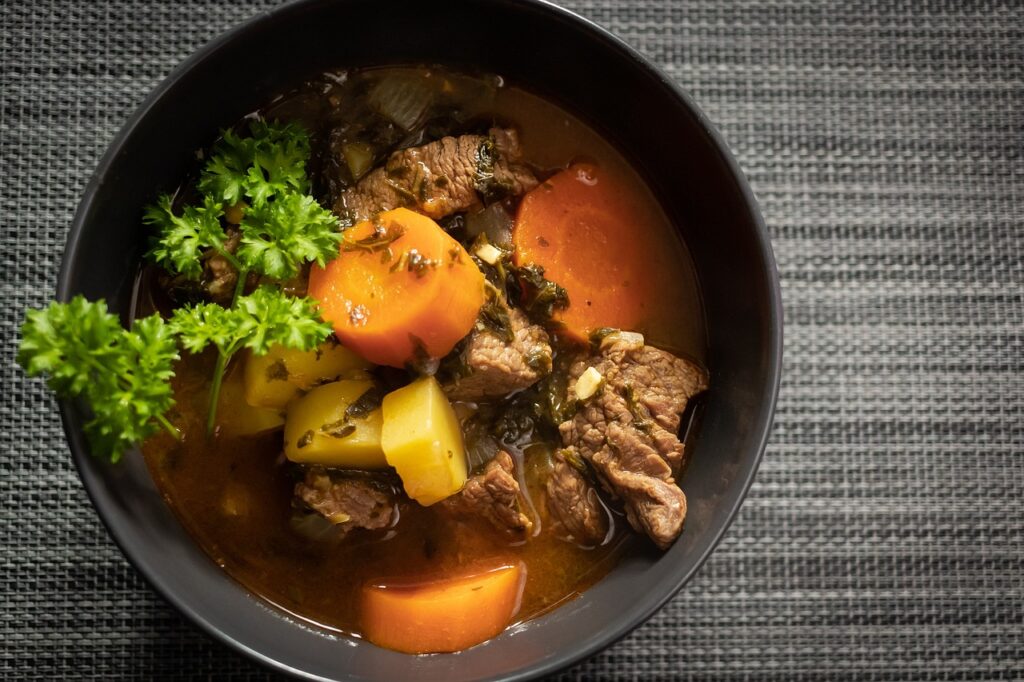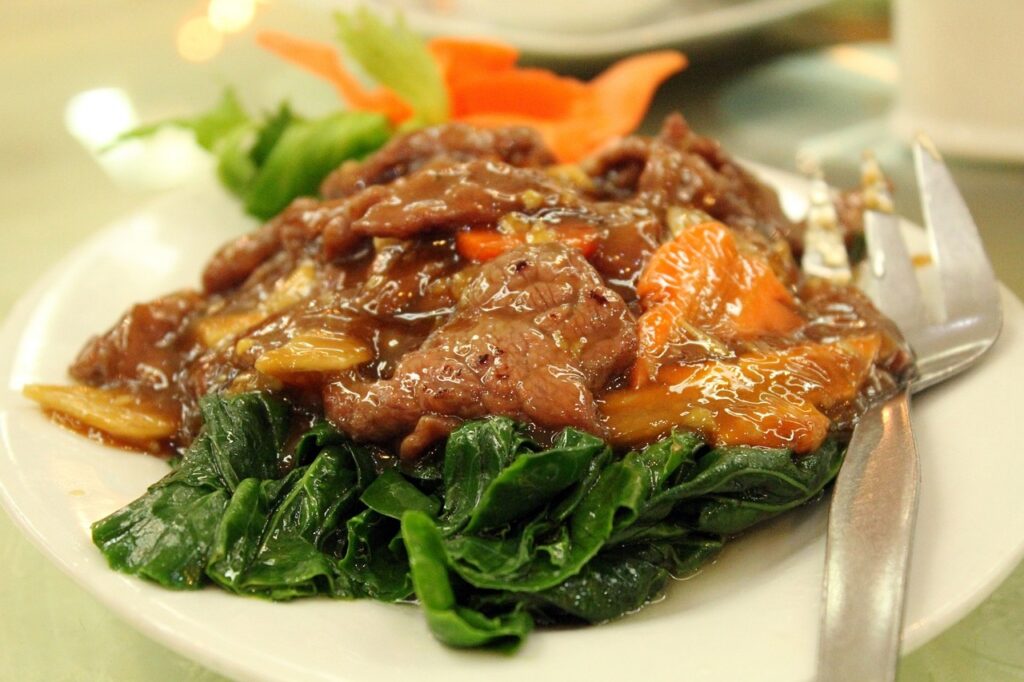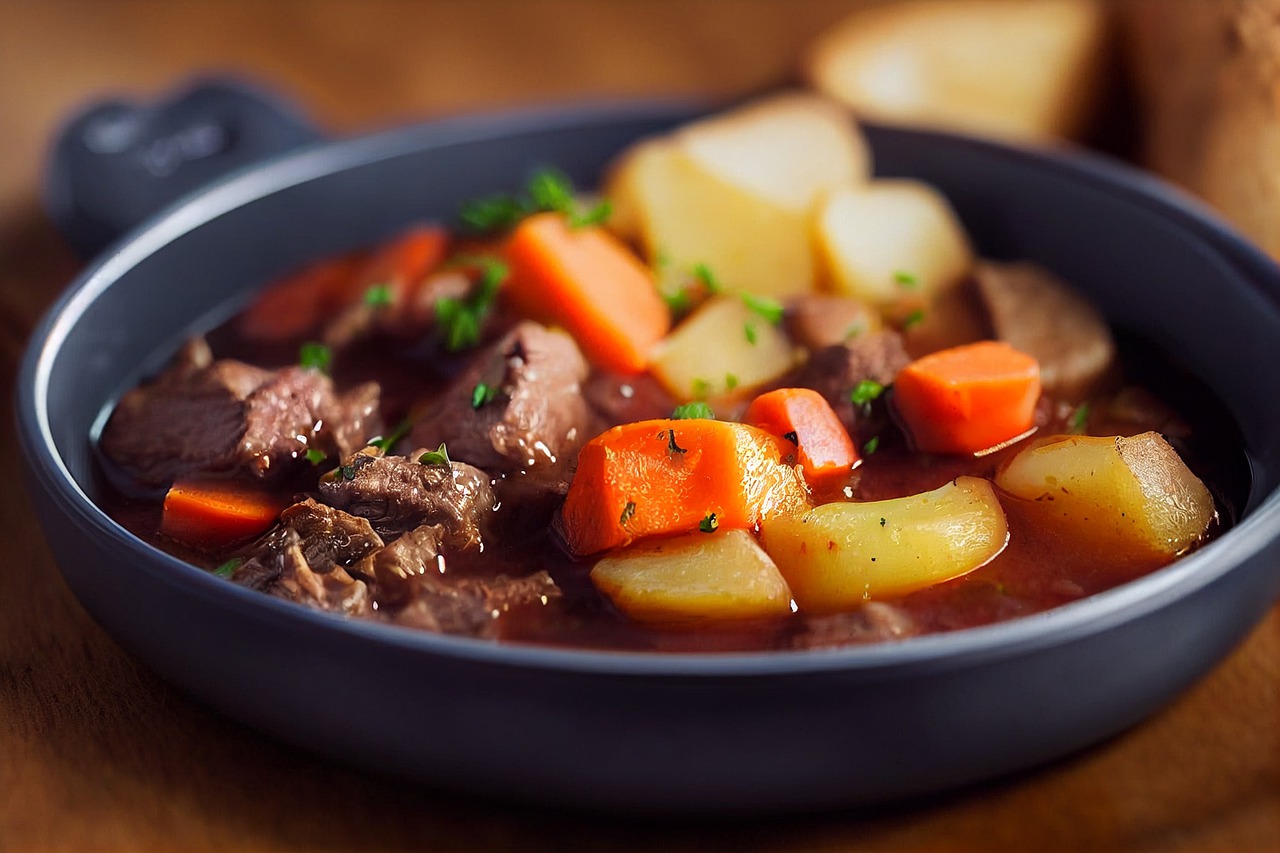Let’s talk about spices for beef stew! As someone who loves to cook, I’m always searching for new flavors to incorporate into my dishes. Since the right spices make all the difference when making a mouthwatering beef stew.
But let’s be real; sometimes, getting the right blend of spices can seem challenging. That’s why I’m here to share some of the best spices for beef stew that you can find in your kitchen. Whether you’re a fan of classic stew spices like thyme and bay leaves or you like a bit of a kick with some cayenne pepper, there’s no denying that the right combination can take your stew from good to great. So let’s get into it!
Introducing Beef Stew

First, let’s discuss what exactly beef stew is. It’s a classic one-pot meal that’s made with cubed beef, vegetables, and a flavorful broth. You can use any cut of beef, although tougher cuts like chuck roast work well because they become more tender as they cook low and in slow cooker. As for vegetables, the possibilities are endless. Carrots, potatoes, onions, and celery are commonly used, but feel free to add any other veggies you like. You can make the broth from beef, red wine, or both. It’s up to you!
Beef stew needs to simmer slowly, which can take a few hours. But the result is worth it, trust me. You’ll want to start by browning your beef in a Dutch oven or heavy pot, then set it aside while you sauté your vegetables. Once they’re softened, add the beef back in along with your broth and any other seasonings you want. Then, let it simmer until everything is tender and the flavors have melded together. This dish is popular all year round, but it’s especially comforting in the colder months.
The Best Spices for Beef Stew

Now that you know what goes into the beef stew, let’s discuss the best spices. Although your stew may already have some flavor from the beef and vegetables, adding a few extra spices will bring out the dish’s complexity. I will share with you my favorite spices for beef stew. I have used them for years, and they have never failed me.
🍾Paprika
Paprika has been widely used in Hungarian cuisine since the late 16th century. It’s made by grinding dried peppers into a fine powder, including sweet bell peppers and hot chili varieties. The powdered peppers’ flavor is regulated according to spiciness levels and color, making it an excellent ingredient for adding color to a dish. Paprika is rich in vitamin C, essential for the body’s health. This spice is also rich in antioxidants and carotenoids that help the body fight inflammation to keep diseases at bay.
When added as a beef stew seasoning, paprika gives it a smoky, sweet taste, which creates depth in the taste and aroma of the dish. The paprika’s warm spice pairs well with tomato-based soups, like beef stew, and hearty beef stews with potatoes, beans, or noodles.
Paprika also enhances the appearance of your beef stew, adding a deep red hue that’s sure to make it more attractive to the eyes. Whether you’re cooking for your family or guests, adding paprika will turn an ordinary beef stew into an impressive meal.
🍾Garlic
There are several reasons why garlic is one of the best spices for beef stew. Firstly, it adds so much flavor to the stew. Its aroma and taste are hard to miss, and it can complement the other ingredients. Garlic has a savory and slightly sweet flavor that pairs well with beef. Secondly, garlic can elevate the overall nutritional value of your beef stew. Studies have shown that garlic has antioxidant properties that protect the body from harmful free radicals. Garlic also contains vitamins and minerals that the body needs for optimal health.
When cooking beef stew, adding garlic is a game-changer. You can use garlic in a variety of ways. For instance, you can use minced garlic, garlic powder, or garlic cloves. Minced garlic and garlic powder are convenient because they’re ready to use, while garlic cloves require some preparation. One way to use garlic cloves is to roast them in the oven before adding them to the stew. Roasting garlic cloves mellows their flavor and brings out the sweetness, adding depth to your stew.
Another fantastic way to add garlic to your beef stew is by infusing it with olive oil. The infusion process is relatively easy; you only need to combine olive oil and garlic in a jar and allow the garlic to infuse the oil for a few days. You can use this infused oil to brown the beef before adding it to the stew. This process adds flavor to the beef while maintaining garlic’s health benefits. In other recipes, infused olive oil can be used as a cooking oil.
🍾Ground Cumin
This spice is native to the eastern Mediterranean and has been used in culinary and medicinal practices for thousands of years. The ancient Egyptians used it in the embalming process, and it was even mentioned in the Bible as a currency. Today, cumin is mostly grown in India, Iran, and Turkey and is a staple in many cuisines worldwide.
So, what makes ground cumin such a great spice for beef stew? For starters, it has a warm, earthy flavor that pairs perfectly with beef and vegetables’ rich, savory flavors. Cumin also has numerous health benefits, including aiding digestion and boosting the immune system. Additionally, it contains antioxidants that may help prevent certain diseases.
Now, let’s learn how to use ground cumin in your beef stew. While many variations of beef stew recipes exist, most call for a mix of beef, vegetables, and broth or stock. To incorporate cumin, start by toasting the spice in a dry pan over low heat for a few minutes until it becomes fragrant. Then, add it to your stew and other seasonings like garlic, paprika, and thyme.
Adding ground cumin to your beef stew will give it a subtle depth of flavor that will make it stand out from other stews you’ve tasted before. It’s important to note that cumin can easily overpower other flavors if you use too much, so start with a small amount and adjust as needed.
🍾Onion Powder
As the name suggests, onion powder is made by grinding dehydrated onions until they turn into fine powder. It has been around for centuries and has been a staple in many dishes. Ancient Egyptians used onion powder as medicine, and Native Americans used it as a food preservative. Onion powder’s popularity grew in America during the 20th century, and it’s now an essential spice in most pantries.
Onion powder has many benefits. It helps to reduce inflammation, lower blood sugar levels, and it’s a natural immune booster. It’s easy to use, and you’ll never have to worry about cutting onions again. And when it comes to enhancing the flavor of your beef stew, onion powder is the answer. It adds a depth of flavor that you can’t get from using fresh onions.
When preparing beef stew, onion powder can add a layer of richness to the dish. The powder blends perfectly with the other flavors and doesn’t overpower them. And there’s no need to worry about the texture of the onion because the powder dissolves quickly during cooking. Also, it’s more cost-effective than buying fresh onions, so you can save money on groceries.
Adding onion powder to beef stew is easy. Simply sprinkle a tablespoon or two into the pot during the cooking process. Mix it with the other spices and let it cook alongside the beef and vegetables. It’s that simple! You can also use it in other recipes like soups, chili, and meatloaf to add an extra layer of flavor.
🍾Cayenne Pepper Powder
Cayenne Pepper Powder has a rich history dating back to Central and South America. It gets its name from the French Guiana city of Cayenne, where it was initially produced. The spice is made from dried and ground cayenne peppers known for their fiery heat. The active component of the spice is called capsaicin, which carries numerous health benefits.
Let’s talk about how Cayenne Pepper Powder can flavor your beef stew. The spice is versatile and can complement various flavors, from mild onion to strong garlic. If you’re using plain water to make your stew, adding a tablespoon or two of Cayenne Pepper Powder would add depth and complexity to your dish. Mix it with other spices to create a unique seasoning blend for beef stew.
For example, 1 teaspoon of Cayenne Pepper Powder, 1 tablespoon of smoked paprika, 2 teaspoons of dried thyme, 1 tablespoon of garlic powder, and a pinch of salt would make an excellent rub for beef stew meat. Coat the meat with the seasoning blend before browning it in olive oil. Then add the rest of the ingredients to make a hearty and spicy stew.
If you’re worried about making your beef stew too spicy, don’t fret! You can always control the heat by starting with a small amount of Cayenne Pepper Powder and adding more. You can also balance the heat with other flavors, such as sweetness or acidity.
🍾Cinnamon
Let’s start with the history of cinnamon. While it might seem like a spice that’s been around forever, cinnamon has a rich and fascinating history. It’s been prized for its flavor and medicinal properties for thousands of years, dating back to ancient Egypt and throughout ancient Rome and medieval Europe.
So, why is cinnamon such a good spice for beef stew specifically? For one, cinnamon adds a depth of flavor beyond just sweetness. It’s a complex spice with a warm, spicy flavor that can enhance the savory notes of beef and other ingredients in a stew. Additionally, cinnamon is known for its ability to bring out the natural sweetness in ingredients, which can balance out the richness of the beef stew. Finally, cinnamon can add a subtle earthy, floral note that can make a stew more fragrant and appealing.
But how do you use cinnamon in beef stew? There are a few different approaches you can take. One option is to add a cinnamon stick or two to the stew as it simmers. This will allow the cinnamon to infuse into the liquid and flavors of the stew. Alternatively, you can mix cinnamon with other spices like cumin, coriander, and chili powder to create a spice blend that will enhance the overall flavor of the stew.
🍾Black Pepper
You may already be familiar with black pepper – it’s sitting on a spice rack in your kitchen. But did you know that black pepper isn’t just good for seasoning a bland meal? It’s also a powerful flavor enhancer that can elevate the taste of beef stew to new heights. Black pepper has a complex spicy, and earthy flavor profile with subtle notes of pine and citrus. When added to beef stew, it can add an extra depth of flavor that makes your taste buds sing.
How do you use black pepper in beef stew? For starters, add it to the beef before you start cooking. Cut the beef into bite-sized chunks, then season it generously with salt and black pepper. Let it sit for a few minutes to absorb the flavors, then brown it in a pot with oil or butter. Once the beef is browned, set it aside and start cooking the vegetables. As you add each vegetable to the pot, sprinkle a pinch of black pepper. This will help layer the flavor throughout the stew.
Another way to use black pepper in beef stew is to add it as a finishing touch. Once the stew is ready to serve, sprinkle freshly cracked black pepper on each bowl. It will give the stew a final flavor burst and a beautiful spice speckling on top. You can also add black pepper to other spices, like thyme or rosemary, to create a unique blend of flavors.
So these are just some of the best spices for beef stew. Whether you use cinnamon, black pepper, or a combination, they will all work together to create a delicious and hearty meal.
Frequently Asked Questions
What herbs go well in beef stew?
From my experience, a few herbs complement beef stew perfectly. Rosemary gives a woodsy flavor to the stew that pairs nicely with the meat, while thyme adds a slightly floral taste. I also like to add a touch of bay leaf for a subtly sweet and aromatic flavor. Finally, a sprinkle of oregano gives the stew an earthy depth.
How much spice should I use for beef stew?
When it comes to adding spices to beef stew, there is no hard and fast rule. It really depends on your personal preference and taste. Generally speaking, start with just a teaspoon or two of each spice and adjust until you get the desired flavor. Taste as you go, and feel free to experiment with different combinations until you find one that works for you.
How do you brighten up beef stew?
A bit of paprika, garlic powder, and thyme can make a difference. Or maybe a touch of cumin and turmeric for a unique twist. Add a pinch of cinnamon or nutmeg if you want a hint of sweetness. These spices will bring out the natural flavors in the beef and vegetables and make your stew more vibrant and flavorful.
Final Words
The magic of spices for beef stew cannot be overstated. I never knew how much these little flavor bombs could elevate a dish until I started experimenting with different combinations in my beef stews. From complex flavors like black pepper and cumin to subtle accents like paprika and cinnamon, I’m always finding new ways to make my beef stew recipes more delicious. So get creative in the kitchen and find out which spices work best for your beef stew!

